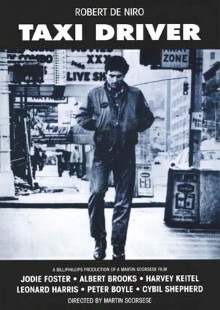
When my cinephile friend saw this one on my list of films to watch, he was surprised. “You mean you haven’t seen this already?” he asked. I guess that’s as good an indication as any of how much this is considered required watching for any fans of cinema. Martin Scorcese and Robert De Niro had previously collaborated on Mean Streets in 1973, the film that put both of them on the map. De Niro had also landed the pivotal role of a young Vito Corleone in The Godfather Part II in 1974. But it was Taxi Driver that would come to be regarded as one of the greatest American films of all time and solidify Scorcese’s reputation as a great auteur.
De Niro is Travis Bickle, a veteran of the Vietnam War who has just returned to New York. Plagued with insomnia, he takes a job as a taxi driver, driving long hours every night through the streets of the city. There is a pent-up rage that builds within him and he rails against the drug dealers and the pimps that he sees on the streets but he seems to have difficulty finding a direction for his life. He intermittently latches on to various causes, being infatuated with a beautiful worker for a presidential candidate’s campaign at one point, and later becoming obsessed with the candidate himself. When he buys a bag full of guns and devotes himself to training his body, you know that whatever happens, it will all end in violence.
I think one reason why Taxi Driver is so highly lauded is because it defies genre conventions and the usual dramatic expectations. Travis’ actions seem erratic and irrational. For example, it isn’t easy to follow his thought process when he decides to assassinate the candidate. Yet what better way could there be to capture the confusion of a mentally disturbed young man? The languorous scenes of him driving his taxi at night has a hypnotic quality to them, to similarly reflect his aimlessness. Just as he looks upon the city and judges it, society and the audience looks at him and judges him. You can see that judgment in the eyes of Betsy, played by Cybill Shepherd, the candidate Charles Palantine when he just happens to take his taxi, even the pimp, played by Harvey Keitel, standing in the street. But as the controversial ending makes clear, that judgment is subject to the vagaries of fate.
I also appreciated how this is at times a shockingly violent film, yet every attempt is made not to glorify the violence but to show how crude, ugly and brutal it is. Combined with how things often don’t go as planned, this makes Taxi Driver feel very, very different from most other Hollywood movies, giving it a powerful and original voice. It makes for yet another good example of how filmmakers start their careers as contrarian types but then become part of the establishment as they age.
All this is made possible only because of the immense acting talent that De Niro brings to the table. The famous “You talkin’ to me?” scene still possesses a powerfully chilling effect even though it has long since entered the popular consciousness. As Betsy’s quote in the film goes, he needs to be a “walking contradiction”. The audience needs to realize that there is something profoundly wrong with him, yet be conflicted over whether he is a figure to be sympathized with or a villain to be despised. The other standout performer is of course Jodie Foster who needs to embody both vulnerability and world-weariness at the age of thirteen.
Still, while I fully endorse it as a cinematic masterpiece that everyone needs to watch, it’s far from being a personal favorite for me. It relies heavily on being set in an America that is still trying to find its way following the debacle of the Vietnam War, and so presents a New York city that is very much a dystopia. This makes it feel less relevant in today’s resurgent America, even if its portrait of how a mentally ill person could become an assassin still seems plausible. Apparently both Scorcese and De Niro are both interested in working on a remake and Scorcese is excited about a 3D version of the “You talkin’ to me?” scene. That feels so very, very wrong and out of touch to me.